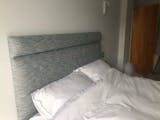Sleep is an essential part of your health. If you're a shift worker, it may be hard to get the amount of sleep that you need after a night shift. This can lead to chronic problems with daytime fatigue and mood as well as increased risk for serious health issues like diabetes, heart disease, hypertension, depression and more.
However, there are some simple things you can do to make sure you're getting enough rest after work. In this article, we'll offer some tips for sleeping after a night shift to help you effectively recharge from a night's work.
Sleep when you get home
You need to sleep as soon as you get home. Getting enough rest is one of the best ways to recover from a night shift. The following tips will help you do just that:
- Use blackout blinds and curtains to keep daylight out
- Keep active throughout the day.
- Give yourself 30 minutes before bed where you avoid screens and monitors.
Keep it quiet
To minimise the effects of noise, you can use earplugs or white noise. A fan or a radio will do, but they're better at drowning out other sounds than they are at making you feel comfortable. White noise is also essential if you're like me and get distracted by the sound of your own breath when it's quiet in the room.
To keep your room dark, make sure to close any curtains or blinds before bedtime so that no light comes in through cracks in the window frames. If that's not possible (or if there are too many windows), then try using an eye mask—it'll block out whatever stray light might be coming from outside and make it easier for your body to know when it should be asleep and when it should wake up again.

Product: Pemberley 9000 Mattress
Make your bedroom a sleep zone
Aside from having a very comfortable bed for your bedroom, there are a few other things you can do to make your bedroom a sleep zone. Consider trying the following:
Go to bed and get up at the same time every day
You should go to bed and get up at the same time every day. If you don't have a regular schedule, your body will be confused about when to sleep, which can lead to insomnia or poor sleep quality. Your sleep schedule works in cycles, so it’s important that you get enough rapid eye movement (REM) sleep to feel rested when you wake up. The best way to do this is through consistent sleep schedules.

Product: Custom Divan Base
Don't overeat before bedtime
Don't overeat before bedtime. If you do, the extra food may be difficult to digest and lead to indigestion and gas. This can make it more difficult for you to fall asleep even as it interferes with your quality of sleep.
Eating a large meal too close to bedtime might also lead to heartburn and other abdominal problems that can keep you awake at night. It's best not to eat anything two hours before going to bed, since this will give your body enough time to digest any food you've eaten so that when it's time for bed, there are no uncomfortable digestive issues keeping you up.
Avoid eating a large meal if you're not hungry or sleepy; only eat small amounts of food if they will satisfy hunger without leaving an uncomfortable feeling in your stomach when lying down on the couch or in bed later tonight (or tomorrow morning).
Avoid caffeine close to bedtime
If you’re trying to sleep after a night shift, avoid caffeine close to bedtime. This means staying away from coffee, tea and sodas during the day and switching over to water around lunchtime. Also, avoid any alcoholic beverages within four hours of bedtime so that alcohol doesn’t interfere with your ability to fall asleep.
It may be tempting to have a cup of coffee in the morning on your way out the door after finishing up your shift, but it can keep you awake if you drink it too late in the day.
Conclusion
In the end, getting enough sleep is a personal responsibility, but one that can affect your health. You have to decide how much time you're willing to devote to sleeping at night and during naps throughout the day. But if you follow these tips, you'll be well on your way to better sleep and a healthier body!
If you’re looking to enjoy a better sleep with a new bed, get in touch with our team at Endurance Beds today.







